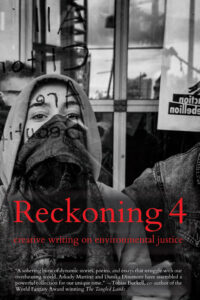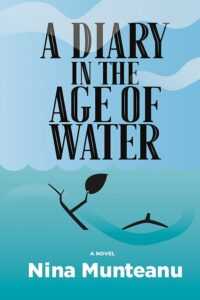 Climate change (and how it relates to the pandemic) is on everyone’s mind these days, and trends in speculative fiction have quickly reflected that. Climate fiction, also called Cli-Fi, is a subgenre of Eco-Fiction in that it involves the direct or indirect effects of climate change in an ecologically focused story.
Climate change (and how it relates to the pandemic) is on everyone’s mind these days, and trends in speculative fiction have quickly reflected that. Climate fiction, also called Cli-Fi, is a subgenre of Eco-Fiction in that it involves the direct or indirect effects of climate change in an ecologically focused story.
SF Canada member Holly Schofield’s short stories about climate change usually take the optimistic approach. Her first cli-fi story was published way back in 2013 in Perihelion. In “Hurry Up and Wait”, an apocalypse survivor is initially happy that he finally is being left alone by society and, well, you can guess how long that lasts. You can find it reprinted in Into the Ruins.
Holly’s stories take place in various locations. “The Knells of Agassiz” (published in the Water anthology heads up north to help preserve Canada’s glaciers. “One Bad Apple” (SciFutures’ City of the Future anthology) journeys to an inner city food forest. “Home on the Free Range” (Analog) examines a complex ecosystem on an exoplanet from the point of view of a farm worker. In the fourth volume of the middle grade Young Explorer’s Adventure Guide, a young girl sneaks out of her habitat home to take an adventurous walk on an alien world because “Fluffy Pets are Best”.
Science always plays a role. “The Weight of the World” (Cli-Fi: Canadian Tales of Climate Change) and the forthcoming “Handful of Empty” (The Way of the Laser anthology) are both about food security under very different circumstances. “Wicked Problem”, (Utopia SF Magazine) has a scientist and her daughter dealing with an actively dangerous climate-changed environment. In “Bear #178” (Winner of Communitech’s True North contest), a tech-enhanced grizzly bear solves the problem of her shrinking habitat in a disastrous way.
Both “The Call of the Wold” (Solarpunk Summers) and “Halps’ Promise” (just released in Solarpunk Winters) take a lighter turn regarding the workings of two very different intentional communities.
“A Distant Honk” (The Unlikely Coulrophobia Remix anthology) takes a humorous look at how feral clowns might adapt to climate change and how we might adapt along with them. “Stewardship” (Unsung Stories) is in a similar vein, a cautionary tale about environmental protection gone wrong.
Some of Holly’s stories are quite serious. “Five Ways to Talk about Twisted Oak Moss” in the Rising Tides literary anthology, examines our past and future environment, using moss colonies as a metaphor for larger habitats.
Holly Schofield travels through time at the rate of one second per second, oscillating between the alternate realities of city and country life. Her short stories have appeared in Analog, Lightspeed, Escape Pod, and many other publications throughout the world. Find her at hollyschofield.wordpress.com
 SF Canada member Geoffrey W. Cole’s novelette “Billy Ray’s Small Appliance Rehabilitation” was recently published in the environmental justice magazine, Reckoning 4. Guest-edited by Danika Dinsmore and (the Hugo, Nebula and Locus Award nominated!) Arkady Martine, this issue focuses on the challenges of urban environments.
SF Canada member Geoffrey W. Cole’s novelette “Billy Ray’s Small Appliance Rehabilitation” was recently published in the environmental justice magazine, Reckoning 4. Guest-edited by Danika Dinsmore and (the Hugo, Nebula and Locus Award nominated!) Arkady Martine, this issue focuses on the challenges of urban environments.







